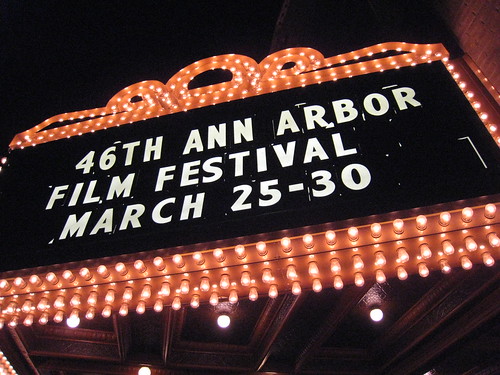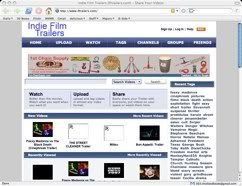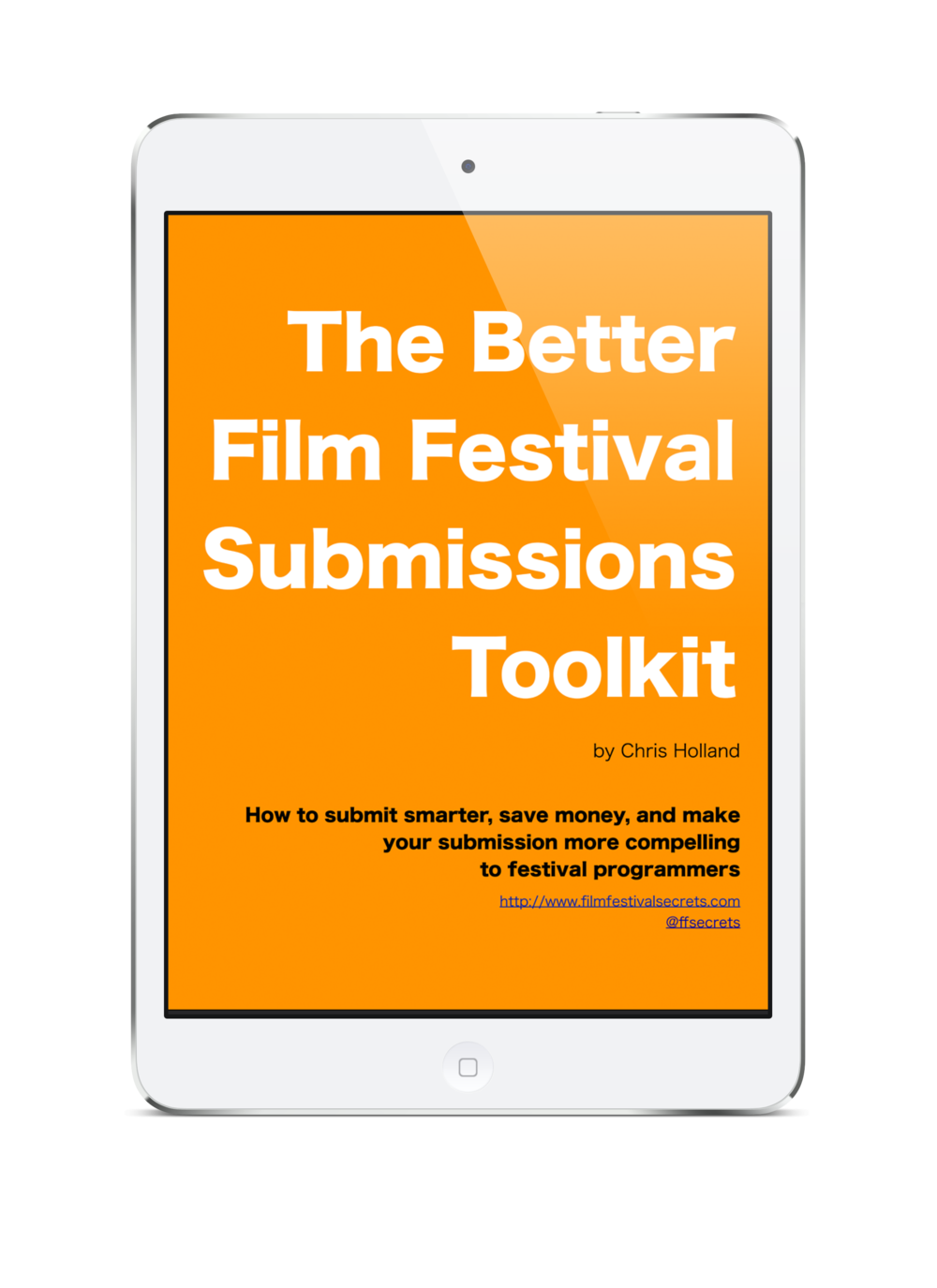In part one we covered some SxSW and film promotion basics.
Part two highlighted the importance of a web site for your film.
Part three discussed some general organizational and travel tips that will make your trip easier so you can think about promoting yourself and your movie.
In part three I mentioned that filmmakers who want to work in the industry for a living should think of a film festival as a career fair, and it is: your peers and potential employers are there, looking to connect with one another. The difference is that it all takes place in a much less organized environment, where screenings and parties and general chaos provide a reason for gathering but occasionally get in the way of conducting business. The challenge lies in connecting to the right people and having the right conversations in the midst of all this, and if you don't prepare then you're relying almost entirely on chance to make this happen. Not that great conversations don't happen by chance, but you don't want that to be your entire plan.
So while you're on the ground at SxSW (or any film festival), do the following:
» Set discrete, measurable, attainable goals. Of course you should think about what your overall goals are for your film and your career, but for the purposes of any one event you need to write down the bite-sized goals that you can accomplish while you're there. "Find a distributor" is not a bite-sized goal. "Talk to ten distributors and establish contact with an acquisition rep at each" is more reasonable.
Put these goals in the front of your notebook (you did buy a notebook, right?) and refer back to them each day so you can stay focused. Check each one off as you finish it for that warm, fuzzy feeling of accomplishment.
» Do groundwork before you arrive in Austin so you don't waste time just getting up to speed. That means reaching out to the press and setting up interviews beforehand as discussed in part 3. Check out the trade show floor map and write down a list of the companies with whom you want to talk. You don't have to have every minute of every day mapped out, but you don't want to spend time in Austin making phone calls or writing emails when you could be enjoying the festival or talking to journalists and other filmmakers.
 » Take advantage of panels and screenings. In addition to South by Southwest's official site, there are a proliferation of tools designed to help you build a schedule of things to do. Keep a detailed calendar so you always have options if you're not actively promoting your film. During the first weekend you should stick close to the convention center to squeeze in as many interviews and marketing activities as possible, but when you're not doing those things the conference has more panels than you could possibly attend, each one stuffed with useful information. Even the occasional clunker will have some interesting people at the front of the room, so stick around afterwards and introduce yourself. With journalists and industry types alike, the phrase "I have a film in the festival this year" is the perfect icebreaker: it identifies you as someone with talent and of potential interest. Use it to your advantage.
» Take advantage of panels and screenings. In addition to South by Southwest's official site, there are a proliferation of tools designed to help you build a schedule of things to do. Keep a detailed calendar so you always have options if you're not actively promoting your film. During the first weekend you should stick close to the convention center to squeeze in as many interviews and marketing activities as possible, but when you're not doing those things the conference has more panels than you could possibly attend, each one stuffed with useful information. Even the occasional clunker will have some interesting people at the front of the room, so stick around afterwards and introduce yourself. With journalists and industry types alike, the phrase "I have a film in the festival this year" is the perfect icebreaker: it identifies you as someone with talent and of potential interest. Use it to your advantage.
The same goes for screenings; after the Q&A, approach the filmmakers and introduce yourself. Be sure to say something nice about the film and ask about their experiences at the festival so far. Chances are good that other filmmakers have met journalists who haven't found you yet, or have learned lessons about the festival experience that could benefit you. You want that knowledge. Be polite about this, and always present it as an exchange of information rather than an information dump. When you find someone who seems particularly well-informed, offer to buy the next round. The collected wisdom of the other filmmakers at SxSW is well worth the price of a few drinks.
» Talk to the press. When Kissing on the Mouth played SxSW in 2005, Joe Swanberg wrote a travelogue with a nice set of tips for filmmakers about the festival. You should read it in its entirety, but I like this passage:
It's not a bad idea to spend a few afternoons hanging around the Filmmaker Lounge, which is conveniently located very near the Press Lounge. Stay visible, and spend some time walking between the two places, seeing who you can bump into. Sometimes press will be conducting interviews with other filmmakers in the Press Lounge, and you can piggyback and do an interview after they are finished. We got some good coverage just from being in the right place at the right time, but the right place was almost always somewhere near the Press Lounge.
 The press have a job to do: present the most interesting news to their audience before their competitors do. In order to make sure you get good coverage, you need to make their job as easy as possible. That's where your web site comes in, and, if you're particularly prepared, an electronic press kit (EPK). An EPK is just a CD-ROM with the basic facts about your film (press releases, cast lists, one-sheet, etc) and some supporting media -- high-resolution stills, trailers in Quicktime format, etc. A good EPK should let a journalist get a good sense of your film in a few minutes just by popping it into her laptop. EPKs have an advantage over web sites in that they work when the laptop isn't connected to the internet, so if you still have time consider putting one together and burning a dozen or so copies to carry with you. (Put them in paper sleeves to save on weight and bulk.)
The press have a job to do: present the most interesting news to their audience before their competitors do. In order to make sure you get good coverage, you need to make their job as easy as possible. That's where your web site comes in, and, if you're particularly prepared, an electronic press kit (EPK). An EPK is just a CD-ROM with the basic facts about your film (press releases, cast lists, one-sheet, etc) and some supporting media -- high-resolution stills, trailers in Quicktime format, etc. A good EPK should let a journalist get a good sense of your film in a few minutes just by popping it into her laptop. EPKs have an advantage over web sites in that they work when the laptop isn't connected to the internet, so if you still have time consider putting one together and burning a dozen or so copies to carry with you. (Put them in paper sleeves to save on weight and bulk.)
One last word on the press: do not be intimidated. They are there to cover the festival, and you're part of the festival. So if you present yourself politely and provide compelling reasons that your film should be part of their festival coverage, the average member of the press will give you serious consideration. That's not to say that the media doesn't house its share of schmucks, or that anyone owes you coverage, but you have a right to conduct business the same as anyone else. Have your screeners and your flyers ready, and go get 'em.
» Stay tuned to the festival news. Subscribe to the newsletters and the SMS updates and read some of the third-party coverage of the festival as a whole. You want to get a sense of where the action is and what events are likely to draw crowds. Most especially you want to be aware of last-minute schedule changes and additions -- things can change in the middle of a festival and you can't make intelligent choices about how to spend your time if you aren't in the know.
» Go to the parties. There are some of you out there who need to be told to do this. When it comes to film festivals, parties are where a lot of business relationships begin. You don't need to stay to the bitter end of every party, nor do you need to go everywhere you're invited, but get out and engage in the art of the schmooze. If your schmoozing skills are rusty, ask for advice from the schmooziest person you know. Be sure to pass out those flyers when the opportunity presents itself. Don't forget to ask for business cards from the interesting people you meet, and try to take it easy on the open bar.
» Visit the trade show floor. Wander the booths. Pick up some swag. SxSW has a trade show for the Interactive and Film conferences where you'll find a little bit of everything. Some companies will be instantly familiar, and others will be of little interest. Still others will be utterly incomprehensible. Get out there among them and soak up some knowledge, have a few conversations. You might just make some good connections, or at least pick up some free t-shirts.
 » Take good notes. I mentioned this in passing back in part 3, but it bears repeating here. You don't need to scribble out every word you hear verbatim, but you should get in the habit of jotting down a note or two after each conversation you have. Make sure you take note of the person's name (even if you got their business card) and what the main points of the conversation were. Don't rely on your memory; it will fail you when you most need it. This is particularly important when it comes to encounters with the press -- a few weeks after the festival you'll want to go back over the contacts you made and see which of them actually wrote something about you. Someone who particularly enjoyed your film may be a good contact for other festivals or later works.
» Take good notes. I mentioned this in passing back in part 3, but it bears repeating here. You don't need to scribble out every word you hear verbatim, but you should get in the habit of jotting down a note or two after each conversation you have. Make sure you take note of the person's name (even if you got their business card) and what the main points of the conversation were. Don't rely on your memory; it will fail you when you most need it. This is particularly important when it comes to encounters with the press -- a few weeks after the festival you'll want to go back over the contacts you made and see which of them actually wrote something about you. Someone who particularly enjoyed your film may be a good contact for other festivals or later works.
Notes are also important for remembering promises you made. If you owe someone a screener or a callback, you don't want to forget. Make a special symbol in your notes for to-do items -- a check box, an asterisk, whatever works for you -- so you'll recognize uncompleted tasks when scanning over your back notes.
» Keep in mind the overall goal of building your career and reputation, not just selling the film at hand. Too many filmmakers blunder onto the festival circuit with unrealistic hopes of a big paycheck and a distribution deal waiting for them right after their premieres. (I call it Weinstein Syndrome.) Watch the Q&As at the screenings you go to and you're bound to see it -- the cast and crew in attendance with eyes just a little too wide and smiles just a little too big. A serious examination of the state of independent film distribution today reveals that very few films get sold at film festivals, and independent pictures in general have a hard road ahead of them when seeking an audience. The good news is that film festivals are the front lines of indie film, and careers really do get built between panels and parties. Opportunity is there, but you have to know where to look and grab it when it shows its face.
» Have fun! I'm sure this all sounds like the least fun you could possibly have at a film festival, but try to balance your business activities with some play. There's no reason you can't do both at the same time. You just need to retain some awareness of you're doing and saying and what it might do for your future as a filmmaker.
My intention was to write an additional entry (on the art of the Q&A and other screening and promo tips) before SxSW begins, but given all the other activity going on I'm not sure I'll make it. I have a few other entries in the hopper for posting in the next day or so and I'll be covering films from different perspectives here and over at Slackerwood as the festival progresses. If you'd like some coverage for your film please feel free to send me some email at chris at filmfestivalsecrets dot com, or come by the B-Side Entertainment booth at the trade show and introduce yourself.
See you in the aisles at South by Southwest!


 » Take advantage of panels and screenings. In addition to South by Southwest's official site, there are a proliferation of tools designed to help you build a schedule of things to do. Keep a detailed calendar so you always have options if you're not actively promoting your film. During the first weekend you should stick close to the convention center to squeeze in as many interviews and marketing activities as possible, but when you're not doing those things the conference has more panels than you could possibly attend, each one stuffed with useful information. Even the occasional clunker will have some interesting people at the front of the room, so stick around afterwards and introduce yourself. With journalists and industry types alike, the phrase "I have a film in the festival this year" is the perfect icebreaker: it identifies you as someone with talent and of potential interest. Use it to your advantage.
» Take advantage of panels and screenings. In addition to South by Southwest's official site, there are a proliferation of tools designed to help you build a schedule of things to do. Keep a detailed calendar so you always have options if you're not actively promoting your film. During the first weekend you should stick close to the convention center to squeeze in as many interviews and marketing activities as possible, but when you're not doing those things the conference has more panels than you could possibly attend, each one stuffed with useful information. Even the occasional clunker will have some interesting people at the front of the room, so stick around afterwards and introduce yourself. With journalists and industry types alike, the phrase "I have a film in the festival this year" is the perfect icebreaker: it identifies you as someone with talent and of potential interest. Use it to your advantage. The press have a job to do: present the most interesting news to their audience before their competitors do. In order to make sure you get good coverage, you need to make their job as easy as possible. That's where
The press have a job to do: present the most interesting news to their audience before their competitors do. In order to make sure you get good coverage, you need to make their job as easy as possible. That's where  » Take good notes. I mentioned this in passing
» Take good notes. I mentioned this in passing 


 #2 - Screening flyers. When you introduce yourself as a filmmaker with a film in the festival, the very next question is usually "what's it about?" and hopefully followed by "when's it playing?" Your screening flyers should contain that information, though you should take the opportunity to answer the questions personally. Follow up the conversation by handing over a flyer with a smile and a question of your own: "Will you come see my film?" Personal commitments like these may be your best chance of filling your screening, so you should always ask. If they say yes, say "I'm looking forward to seeing you there!" If they say no or are non-commital, point to the flyer and ask them to hang onto it just in case they find their prior engagement has fallen through.
#2 - Screening flyers. When you introduce yourself as a filmmaker with a film in the festival, the very next question is usually "what's it about?" and hopefully followed by "when's it playing?" Your screening flyers should contain that information, though you should take the opportunity to answer the questions personally. Follow up the conversation by handing over a flyer with a smile and a question of your own: "Will you come see my film?" Personal commitments like these may be your best chance of filling your screening, so you should always ask. If they say yes, say "I'm looking forward to seeing you there!" If they say no or are non-commital, point to the flyer and ask them to hang onto it just in case they find their prior engagement has fallen through. A few months ago while wandering the internet in search of indie-film related advice (let's call it pre-pre-research for FFS), I came across a blog entry that suggested filmmakers eschew building their own web sites and use MySpace as their primary internet presence. (Many apologies to the author of the piece, whose blog escapes me at the moment -- I'll be sure to link if I stumble upon it again.) I can't help but respectfully disagree. A well-built web site is one of the most powerful marketing tools an indie filmmaker can possess. A mere MySpace page is no substitute. Here's why:
A few months ago while wandering the internet in search of indie-film related advice (let's call it pre-pre-research for FFS), I came across a blog entry that suggested filmmakers eschew building their own web sites and use MySpace as their primary internet presence. (Many apologies to the author of the piece, whose blog escapes me at the moment -- I'll be sure to link if I stumble upon it again.) I can't help but respectfully disagree. A well-built web site is one of the most powerful marketing tools an indie filmmaker can possess. A mere MySpace page is no substitute. Here's why:
